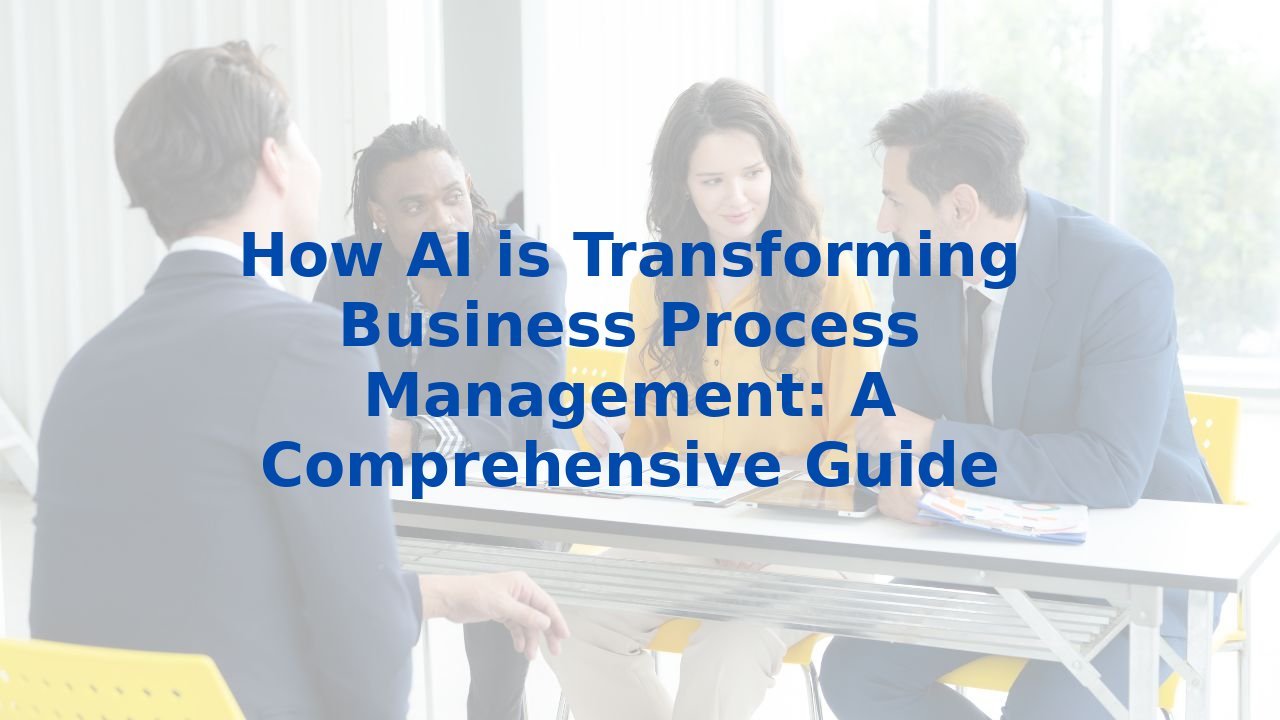How AI is Transforming Business Process Management: A Comprehensive Guide

How AI is Transforming Business Process Management: A Comprehensive Guide
In the ever-evolving landscape of business, efficiency is not just a goal; it’s a necessity. As organizations strive to keep pace with rapid change and mounting competition, the integration of Artificial Intelligence (AI) into Business Process Management (BPM) has emerged as a game-changer. Let’s explore how AI is reshaping traditional business processes and uncovering pathways to unparalleled efficiency.
Understanding Business Process Discovery
At the heart of optimizing organizational processes lies Business Process Discovery. This initial step is typically marred by manual data analysis and employee interviews, which can be exhaustive and error-prone. Enter AI—a tool that sifts through vast amounts of operational data with lightning speed. It detects patterns and workflows that might otherwise go unnoticed. This critical phase serves as the foundation for identifying inefficiencies and bottlenecks, setting the stage for an overall streamlined operation.
The Power of AI Process Mapping
Once businesses have unearthed insights from the discovery phase, the next step is AI Process Mapping. Here, AI takes those insights and crafts them into actionable blueprints. By utilizing machine learning and data analytics, AI creates visual workflows that articulate how processes interconnect, highlighting points of inefficiency. With customized process maps at their fingertips, stakeholders gain clarity and understanding, empowering them to optimize their strategies.
Automating Processes with AI
Perhaps the most visible impact of AI in BPM is through Process Automation. Traditional, repetitive tasks are prime candidates for automation, and here is where Robotic Process Automation (RPA) shines. AI-equipped RPA tools can perform repetitive tasks—like data entry and customer service responses—flawlessly and tirelessly. This not only boosts efficiency but also liberates human resources to tackle high-value activities within the organization.
AI Driving Continuous Process Improvement
In the realm of BPM, continuous improvement is an ongoing journey, and AI serves as a valuable catalyst. Through real-time feedback and data-driven recommendations, organizations can iteratively enhance their operations. By leveraging AI to establish feedback loops, continuous process evaluation becomes possible. This ensures that BPM strategies are dynamic, aligning with shifting industry standards and organizational objectives.
Benefits of AI in Business Process Management
Integrating AI into BPM isn't just about automation—it's about profound benefits:
- Enhanced Efficiency: By automating routine tasks, AI minimizes human error and accelerates data analysis, driving quicker and more accurate decision-making.
- Improved Decision Making: AI provides predictive insights from data patterns, allowing organizations to navigate complexities with confidence.
- Real-Time Monitoring: The capability of AI to monitor processes in real time allows for prompt identification and rectification of potential issues.
- Risk Minimization: AI identifies inconsistencies and anomalies, helping companies mitigate risks and adhere to regulatory standards.
The Importance of Training Employees for AI
While AI is a formidable ally, its effectiveness hinges on one crucial factor: employee training. Training ensures that team members grasp AI’s capabilities and learn to collaborate with these smart systems. Key areas of focus include:
- Understanding AI Capabilities: Employees should be educated on how AI simplifies tasks and supports decision-making.
- Data Analysis Skills: Data literacy must be prioritized, enabling employees to decode AI-generated insights effectively.
- Collaboration with AI Systems: Training should also prepare employees to work seamlessly alongside AI tools, fostering an environment of cooperation.
Investing in such training initiatives not only empowers the workforce but enhances overall process management and organizational performance. Strongly equipped employees can navigate the nuances of AI integration, which ultimately drives better outcomes.
Conclusion
The integration of AI in Business Process Management is a revolution that redefines how organizations operate. By embracing AI for process discovery, mapping, automation, and perpetual improvement, companies unlock a realm of efficiencies that pave the way for future success. As technology evolves, the commitment to employee education will be integral in maximizing AI’s transformative potential—ensuring organizations not only survive but thrive in a competitive landscape.
For those eager to elevate their understanding of AI and its applications in BPM, consider diving into comprehensive training options tailored for your organization. By taking the first step towards education, you’re paving the way for a future where efficiency and innovation are not just aspirations, but realities.